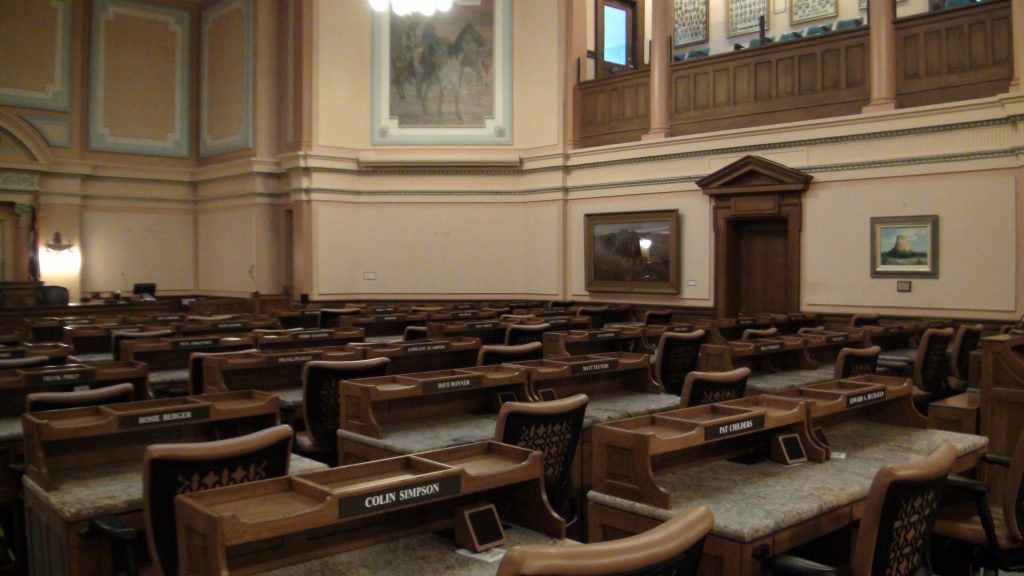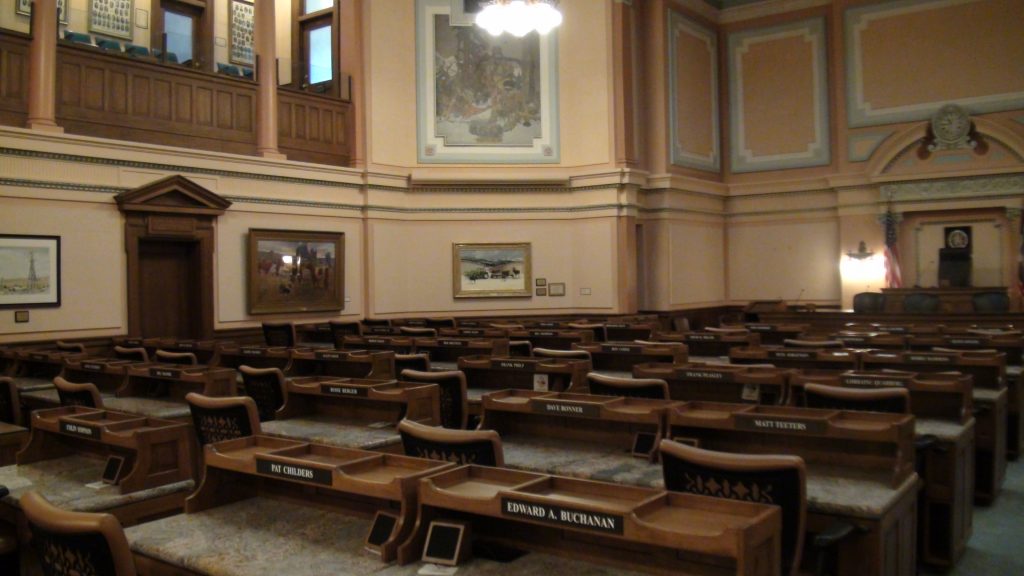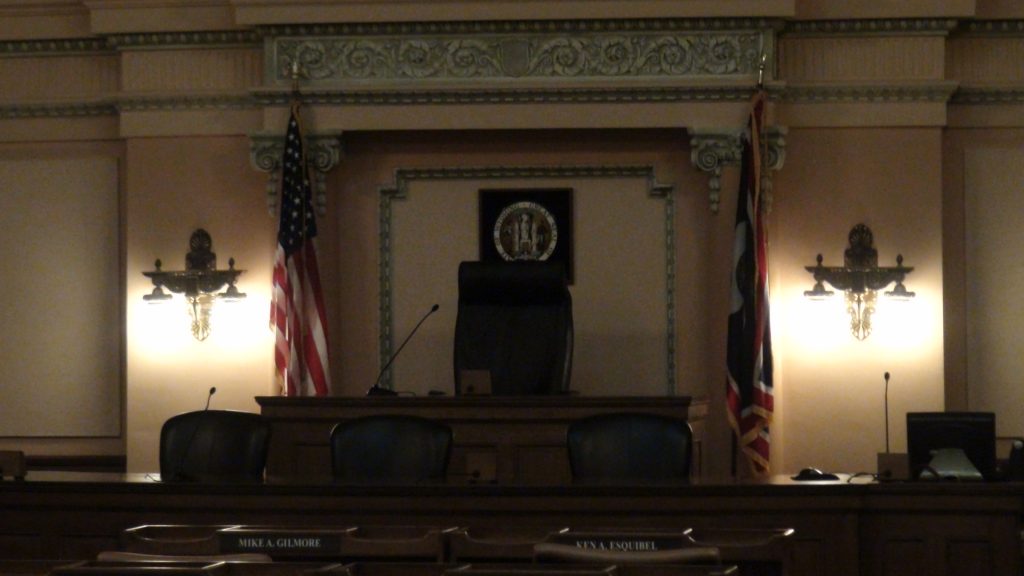Granite desks at Wyoming Capitol. Ooooh fancy.
Monday, 1 July 2024
preaching the kingdom of God and teaching the things which concern the Lord Jesus Christ with all confidence, no one forbidding him. Acts 28:31
Note: You can listen to today’s commentary courtesy of our friends at “Bible in Ten” podcast. (Click Here to listen)
You can also read this commentary, scrolling with music, courtesy of our friends at “Discern the Bible” on YouTube. (Click Here to listen), or at Rumble (Click Here to listen).
A more literal rendering is, “Proclaiming the kingdom of God and teaching these about the Lord Jesus Christ with all boldness – unrestrictedly” (CG).
In the previous verse, it was noted that Paul dwelt two full years in his own rental while receiving all who came to him. With that remembered, we now come to the final verse in this marvelous book called Acts. It finds Paul busily doing what he was called to do so many years earlier by his Lord. Luke notes he was “Proclaiming the kingdom of God.”
It is a certainty that if there is a kingdom, then there must be a king over that kingdom. This final verse of Acts dispels the false teaching that Jesus is not a reigning King over the church and that the kingdom only refers to an earthly kingdom that Jesus will reign over during the millennium.
Paul teaches the present reality of the Christian kingdom numerous times, and he also speaks of it as a future reality. This is not unlike salvation itself. We are saved for a future state of eternal existence that we do not now fully possess. And so, salvation is both a present reality as well as a future hope. This is true with sanctification, etc.
As for the kingdom being a present reality, Paul says elsewhere –
“He has delivered us from the power of darkness and conveyed us into the kingdom of the Son of His love, 14 in whom we have redemption through His blood, the forgiveness of sins.” Colossians 1:13, 14
Such doctrine as this concerning the kingdom constitutes what Paul would have said to those in his rental in Rome. With that, Luke next records, “and teaching these about the Lord Jesus Christ.”
Again, if there is a kingdom, there is a king. In the case of the Kingdom of God, its King is the Lord Jesus Christ. This precept is not to be ignored. Jesus fills innumerable roles for His people. He is their Savior, Redeemer, Hope, Lord, Passover, Shepherd, etc.
Each of these roles helps us to better understand and appreciate what God in Christ has done. Paul would have spent innumerable hours explaining these things to anyone who came by to hear the good news or to receive doctrine concerning these.
But considering that Paul was proclaiming this kingdom right in Rome, it is telling us that despite having real human governments and authorities placed over us and to whom we are to be subject (Romans 13:1-7), we have a higher allegiance and an eternal hope that is grounded in Jesus Christ.
Paul’s words could have caused a lot of trouble if they were taken out of the greater context of his teachings. But with a Roman guard standing right there, the context would have been maintained and any accusations against him could easily have been cast aside.
The guard could testify that Paul’s proclamations concerning King Jesus were a future hope, as well as a present state that called for him to yield to the authorities over him at the same time. Thus, Paul was safe in his proclamation. And it was a proclamation that he made “with all boldness.”
Paul never shied away from saying exactly what was proper and appropriate. In Galatians 2, it was seen that Peter was stepping back from the gospel and being led astray by the false teachings of the Judaizers. When that happened, Paul gave him an earful –
“Now when Peter had come to Antioch, I withstood him to his face, because he was to be blamed; 12 for before certain men came from James, he would eat with the Gentiles; but when they came, he withdrew and separated himself, fearing those who were of the circumcision. 13 And the rest of the Jews also played the hypocrite with him, so that even Barnabas was carried away with their hypocrisy.
14 But when I saw that they were not straightforward about the truth of the gospel, I said to Peter before them all, ‘If you, being a Jew, live in the manner of Gentiles and not as the Jews, why do you compel Gentiles to live as Jews? 15 We who are Jews by nature, and not sinners of the Gentiles, 16 knowing that a man is not justified by the works of the law but by faith in Jesus Christ, even we have believed in Christ Jesus, that we might be justified by faith in Christ and not by the works of the law; for by the works of the law no flesh shall be justified.’” Galatians 2:11-16
This is the type of boldness that defined the apostle Paul. He was unashamed to stand against those who would compromise the gospel, even if it included an apostle who had lived with and experienced the first-hand workings of the Lord Jesus. When Peter shied away from what he was called to proclaim, Paul boldly corrected him.
To this day, Paul’s epistles continue to do this for us. If we, as believers in the Lord Jesus Christ, are willing to hold to the word faithfully, we will proclaim what God has inspired through Paul, never waffling on what he has set forth for us.
Luke next finishes the book of Acts with true flair. His writings have introduced an enormous number of rare words, some are only found within the pages of Scripture. Of Paul’s bold proclamations, Luke finishes the book with the word akólutós, unrestrictedly.
It is an adverb found only here, coming from the negative particle a, and kóluó, to hinder, prevent, debar, etc. Thus, it signifies unhindered, unrestricted, etc. A single adverb to appropriately carry the sense would be “unrestrictedly.”
Paul was not forbidden to speak, and he faithfully used his privileges to boldly proclaim the goodness of God by sending Jesus to do all things prophesied, even from the earliest pages of Scripture.
Life application: In his own hired quarters, Paul could preach of the kingdom of God and teach from copies of the Scriptures that he surely possessed. His words would speak of all of the things which pointed to and spoke of Jesus.
The fullness of this message, however, has not yet been fully searched out. Paul merely opened up the eyes of the Gentiles to the Word of God and to the power of His salvation. He proclaimed it with confidence because he was a Jew who was regarded as a Jew, teaching a valid interpretation of the Jewish religious system which was considered legitimate under Roman law.
Because of his place and position, John Gill states –
“…not the Roman emperor, nor the Roman senate, nor any other magistrate; nor could the Jews hinder him, nor was his mouth to be stopped by any; nor could the open door of the Gospel be shut, or its course be impeded; for though the apostle was bound, the word of God was not.”
Paul was left unhindered in his speech and teachings. In reality, it was the sweetest spot for the man to be in. He was doing what he loved most, and he was doing it in the very center of the Gentile nations that he had been called to minister to.
With this, the book of Acts has come to its completion. For those who have followed along in the original publication of this commentary, it has taken you through 1007 verses, one per day, equaling a time of study and contemplation of 2.76 years. Your time with me has been most appreciated.
For those who came in later or who will read this in the future, thank you for sharing in the book of Acts. May God bless you as you read and study it and the rest of the body of Scripture all the days of your life.
This work would not have been possible without the following people who voluntarily assisted in ensuring it would make it to those who have followed along, doing this every single day over the past 1007 days:
Joey D’Andrea
Bob Hart
Daniel Higgins
Mike the Webguy
Wade Nolan
May the grace of God be with you always.
Lord God, thank You for the book of Acts, one of the sixty-six best books in Your precious word. And above all, thank You for Jesus Christ our Lord who is the center and focus of Acts, and indeed all of Scripture. Thank You for our precious Lord Jesus. Hallelujah and Amen.





